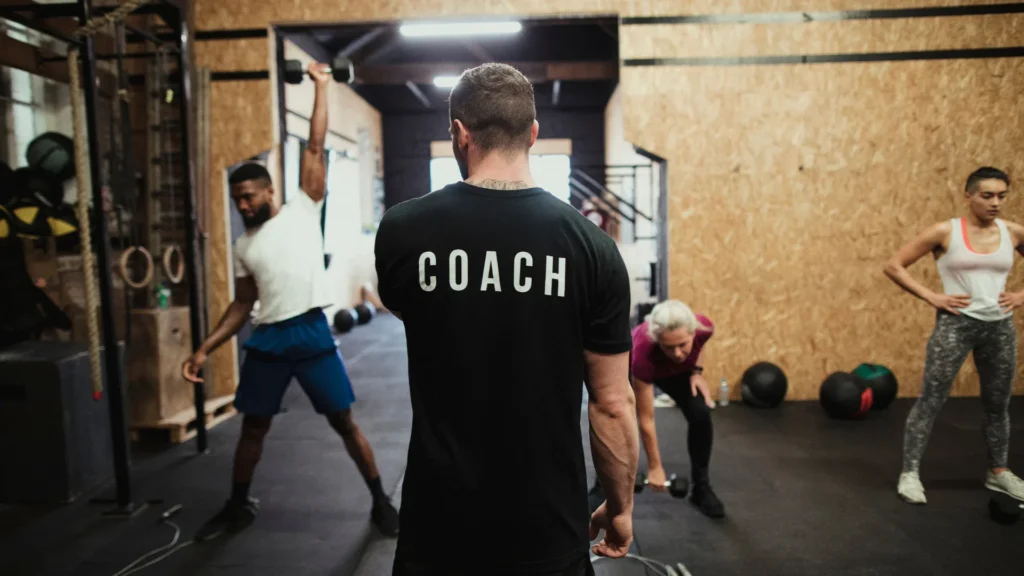5 Ways Having a Mindset Coach Can Transform You

We easily see the power of physical skills and talent when an athlete does something remarkable in sports.
Or in business when the company has exceptional results.
Or in the performing arts when we are left in awe after witnessing beauty on-stage.
But what we don’t see is how each of these high performers got there.
Meaning the mindset that kept them growing through adversity and challenges.
It is your mindset that will determine how far you will go.
So it makes sense that investing in a mindset coach may be one of the most profitable choices you can make.
In this article, we’ll explore what a mindset coach is and does, how a mindset coach can specifically help you, and end with five ways utilizing a mindset coach can transform your performance.
What a Mindset Coach Is
Think of a mindset coach as your personal guide to unlocking your full potential.
Just like a coach on the field helps you improve your physical skills, a mindset coach focuses on building mental and emotional skills that sets high performers apart from the rest of the pack.
It goes far beyond motivational quotes.
A mindset coach is a skilled professional who understands the intricate workings of the human mind and how thoughts and feelings influence performance in every aspect of your life.
Central to a mindset coach’s approach is personalization.
They recognize that no two individuals are alike and tailor their strategies to align with your unique strengths, weaknesses, and objectives.
But a word of caution here.
There is no regulatory authority for the coaching profession.
That means anyone can literally print a business card with the title ‘mindset coach’ and coach away.
So you will want to ask about the background, training, methods and results of any coach you are looking to hire.
The Mindset Coach Standard
As a Certified Mental Performance Consultant myself since 1999, I am biased to this standard of mindset coaching because of the respect I have for the Association for Applied Sport Psychology (AASP), of which I’ve been a Fellow since 2010.
From their website, “AASP is the premier association that ensures every performer has the resources to strengthen their inner edge through the advancement and application of excellence in mental performance and mental health.
To do that we cultivate an inclusive field of Certified Mental Performance Consultants® (CMPCs), licensed mental health professionals, educators, and researchers.
Because when we research, train, and serve performers’ complete mental needs, we elevate their ability to perform and thrive.
AASP is the only place to earn the CMPC®, the sole accredited certification for mental performance in North America and a growing prerequisite for working with various sport and performance populations.
CMPCs have the expertise, skills, and confidence to help performers develop and use mental, life, and self-regulatory skills to enhance their talent, enjoyment, and/or personal development in their performance domain.”
In fact, CMPC is required to serve on the US Olympic and Paralympic Committee Sport Psychology/Mental Training and Mental Health Registries (of which I am also a member).
It is also at least a preferred qualification, if not a requirement, for many jobs in Division I athletic programs and professional sports.
“Certification as a Certified Mental Performance Consultant (CMPC®) demonstrates to clients, employers, colleagues, and the public at large that an individual has met the highest standards of professional practice, including completing a combination of educational and work requirements, successfully passing a certification exam, agreeing to adhere to ethical principles and standards, and committing to ongoing professional development.
These individuals have obtained objective validation of their expertise in helping clients develop and use mental, life, and self-regulatory skills to optimize performance, enjoyment, and/or personal development in sport or other domains (e.g., performing arts, military). CMPC®s are individuals with a master’s or doctoral degree in sport science, psychology or a closely related field who have met specific course requirements and have completed an extensive, mentored applied experience.”
CMPC ensures a basic level of competence, education and training and for these reasons, may be an ideal certification for a mindset coach. This is why it was the first certification I pursued after graduating with my Ph.D. and why I currently serve as the AASP committee leader in promoting CMPC to youth sport organizations. I believe that as a mindset coach, the earlier we can develop a growth mindset in young athletes, the better their performance (and their lives) will be.

How Can a Mindset Coach Help You?
As a type of performance coach, a mindset coach can help you in a number of ways.
Here are the five biggest benefits I’ve seen with my athletes and clients.
First, a mindset coach will help you tap into the power of your thoughts, emotions, and beliefs to drive consistent high-level performance.
We are constantly swimming in our thoughts and feelings, and the influence of these external experiences is constantly affecting our behavior.
A mindset coach provides you with the tools to overcome performance anxiety, manage stress, and stay laser-focused on your goals.
These are skills that can be practiced and improved, just like physical skills.
Your mindset coach leads you through your path to excellence.
One of the most common challenges is our self-limiting beliefs.
Every single one of us has a little (but sometimes loud) voice inside our heads that can tell us we’re not good enough.
A mindset coach is your partner in learning how to recognize how, when and why this inner critic gets going, and how to best interact with it so you can be free from its influence.
Imagine how good you will be when you unhook from what this inner critic keeps telling you!
One result would be to stay clutch under pressure.
Whether you’re hitting a game-winning shot or making a crucial business decision, pressure situations can make or break you.
A mindset coach equips you with mental strategies to thrive under pressure.
By channeling nervous energy into a focused state of mind, you’ll consistently deliver clutch performances.
Speaking of nerves, have you ever felt overwhelmed by the sheer number of goals you’ve set?
A mindset coach helps you break down your ambitions into actionable steps.
They assist you in crafting a personalized game plan, teaching you how to set achievable targets and stay committed to your journey.
A mindset coach helps you identify your single next best step towards your ultimate goal, reducing overwhelm and channeling your focus and energy into an actionable step that promotes real progress.
A mindset coach helps you because your mind and body are inextricably linked, and a mindset coach knows just how to optimize this connection.
They’ll guide you in understanding how your thoughts and emotions impact your physical performance.
This holistic approach ensures you’re firing on all cylinders, whether you’re on the field or in the boardroom.
It maximizes your development because mindset is everything when it comes to physical performance.
5 Ways Having a Coach Can Transform You
1. Rewire Your Brain for Success
Research in the field of neuroscience has shown that the brain is remarkably adaptable, meaning you can train it to adopt new patterns of thinking.
A mindset coach acts as your mental architect, helping you rewire your brain for success.
By consistently practicing positive habits and thought patterns, you’ll forge neural pathways that lead to enhanced focus, confidence, and resilience.
2. Tap Into Flow States
You know those moments when you’re so immersed in an activity that time seems to stand still?
That’s called a flow state, and it’s a peak performance zone where your skills meet the challenge at hand perfectly.
There are eight characteristics of flow:
- complete concentration on the task
- clarity of goals with reward in mind and immediate feedback on progress toward these goals
- speeding up/slowing down of time
- finding the experience as intrinsically rewarding
- effortlessness and ease
- a balance between challenge and skills
- actions and awareness are merged
- losing self-conscious rumination, and
- there is a feeling of control over the task.
A mindset coach can help you develop the skills (like this focus exercise) to help you access these flow states more frequently.
By understanding the conditions that foster flow, you’ll be able to enter this state of optimal performance with greater ease and frequency.
3. Develop a Growth Mindset
Carol Dweck’s groundbreaking work on mindset highlights the power of cultivating a growth mindset.
A mindset coach helps you embrace challenges and setbacks as opportunities for growth.
Instead of fearing failure, you’ll learn to see it as a stepping stone to success.
This mindset shift not only boosts your performance but also fuels your overall personal and professional development.
4. Build Self-Discipline and Commitment
Self-discipline is a requirement for success in any area.
Ultimately you are alone in your training.
No one can do your push-ups for you.
And there are many times your coach or boss isn’t there to motivate or remind you to do something.
People lacking self-discipline are always behind where they could be, and often behind their competition.
A person can be highly educated, talented, and experienced, but if they lack basic self-discipline, they are unlikely to be successful.
A mindset coach helps you break out of unhelpful habits that are holding you back.
A mindset coach will help you increase your awareness of the thoughts, feelings and situations you may be automatically responding to, or the stressful emotional states you are avoiding.
You can then build the skills necessary to best engage these internal experiences and move forward.
As a result of being more self-disciplined, you then become more committed to whatever it is you set your mind to.
Many of us are easily distracted or bounce from one thing to the other.
This results in a lack of depth in the process of what it takes to get things done.
But being committed to your sport, work, studies, health, business, or your significant other requires a willingness to do what needs to be done.
No. Matter. What.
This commitment can be developed through mindset coaching.
A mindset coach will ask thought provoking questions to help you gain clarity on what matters most to you, and help you utilize that meaning to motivate you through adversity, enabling you to stay committed to your course of action.
5. Create Lasting Habits
Many of us have heard the infamous “21-day rule” to form a habit.
However, this number isn’t backed by solid scientific evidence.
Habit formation is highly individual and can vary based on the complexity of the habit, personal circumstances, and individual differences.
Research suggests that it takes an average of 66 days to form a new habit, but this number can range from 18 days to 254 days depending on the individual.
The key is consistency and repetition.
The more you engage in the habit loop, the stronger the neural connections become, making the behavior more automatic over time.
A mindset coach knows that habit formation is a nuanced process that requires intention, consistency, and the right strategies.
They’ll guide you in creating habits that support your goals, whether it’s a consistent workout routine, effective time management, or cultivating a growth mindset.

Conclusion
High performers in all areas can benefit immensely from the guidance of a skilled mindset coach.
By embracing the insights of psychology and neuroscience, you’ll embark on a journey of self-discovery that empowers you to conquer challenges, thrive under pressure, and unleash your full potential.
So, whether you’re a CrossFit enthusiast, a highly successful entrepreneur, a talented musician, or a family-focused individual, remember that your mind is your greatest asset, and a mindset coach is your partner in unlocking its limitless potential.
If you like what you’ve read above and are looking to improve your mindset, join me inside Success Stories Membership and let’s get started.
Members rave about the support from the community.
They have overcome challenges ranging from perfectionism and performance anxiety, to lack of motivation and procrastination, en route to developing consistent habits that improve their performance and their lives. Start your journey here today.



